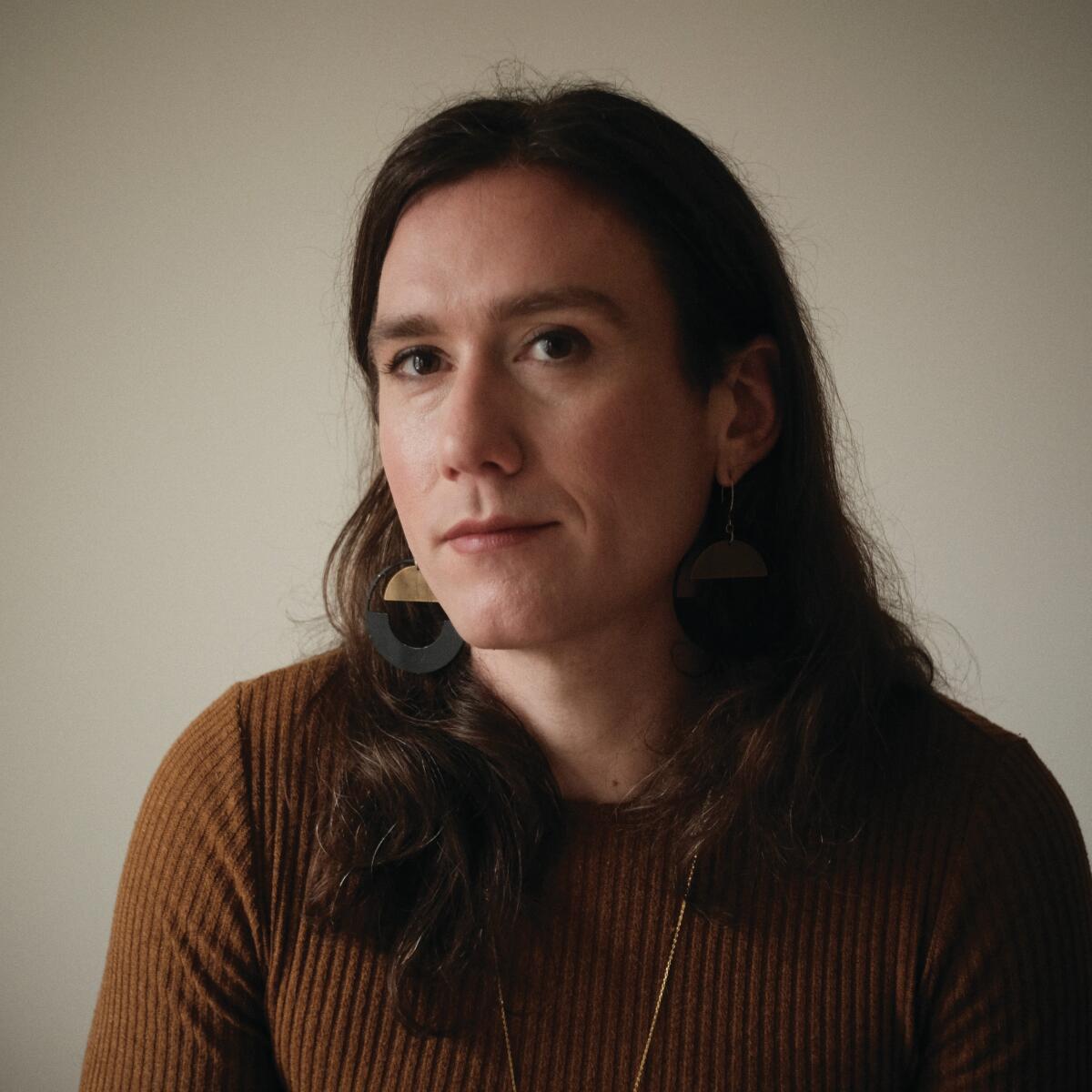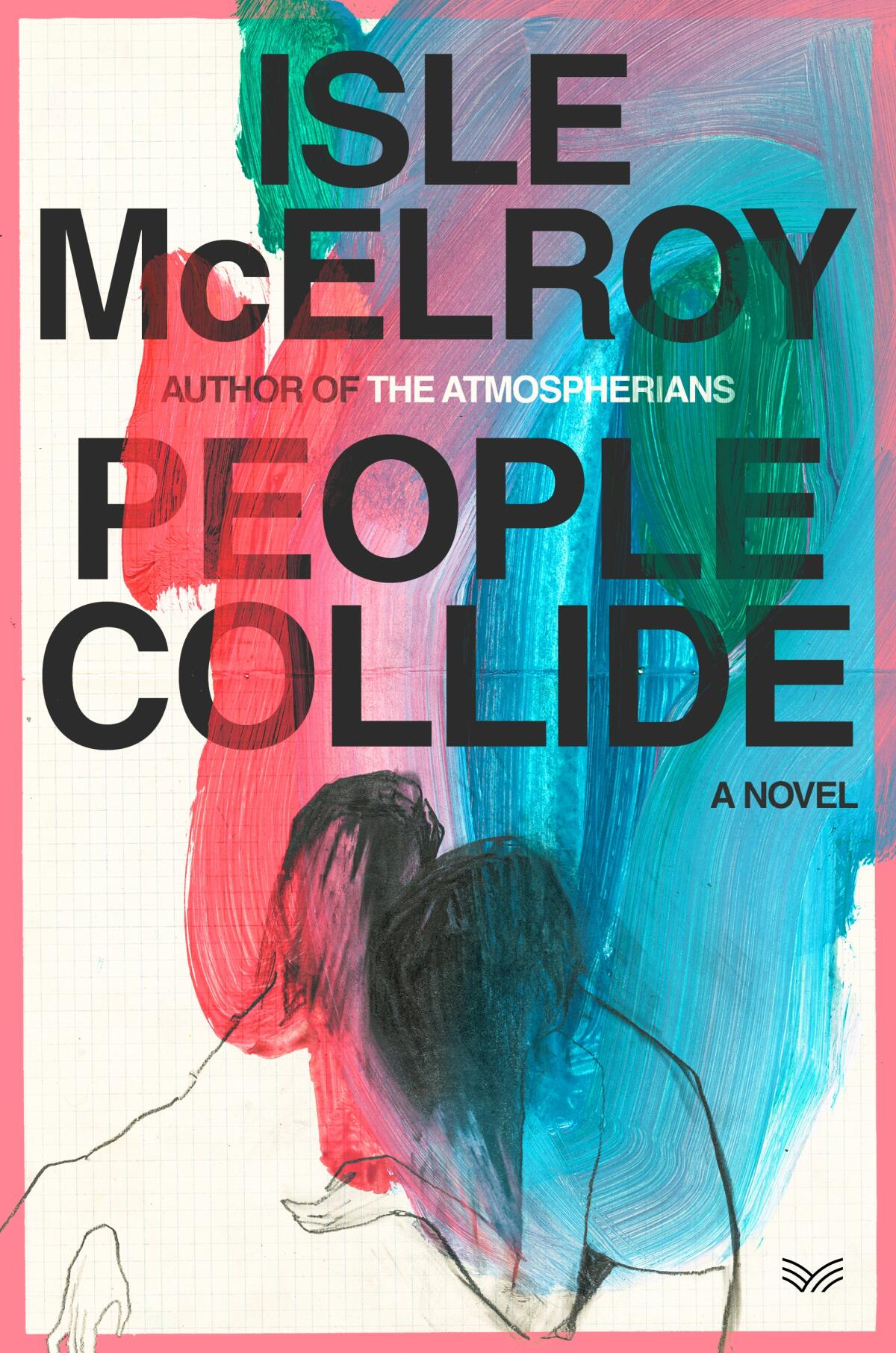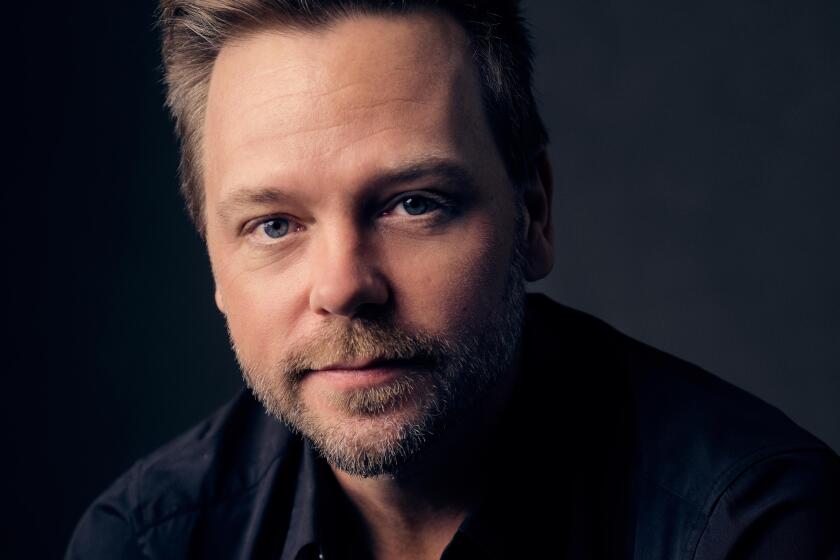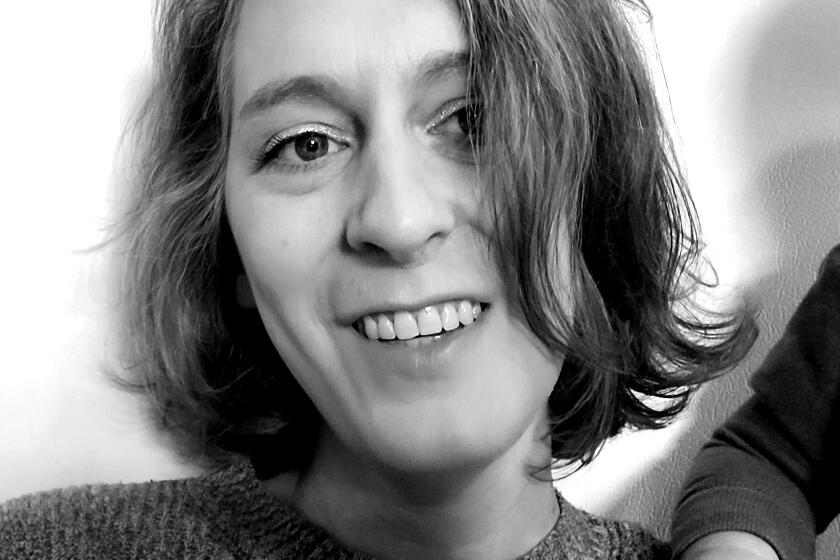A married couple on the rocks switch bodies — and fall in love all over again

- Share via
Review
People Collide
By Isle McElroy
HarperVia: 256 pages, $29
If you buy books linked on our site, The Times may earn a commission from Bookshop.org, whose fees support independent bookstores.
“People Collide,” by Isle McElroy, is a delightfully gimmicky novel about how gender is a gimmick. It starts off with a tried-and-true fictional premise, the semi-dysfunctional marriage, but then turns that marriage inside out, just about literally. The result is a story that finds queerness at the core of heterosexual marriage and, conversely, a heterosexual romance arc inside a gender transition novel.
The wayward path sketched by McElroy, who uses they/them pronouns, starts in Bulgaria, where rising American intellectual star Elizabeth has taken a prestigious government-funded teaching job. It’s a launching pad for what promises to be an impressive academic and literary career. Before she left she married Eli, her underachieving aspiring-writer husband.
Eli opens the novel musing about his inadequacies. “I am not a responsible man. I am not a brave man. … My wife, Elizabeth, was the brave one.” These thoughts spur him, uncharacteristically, to clean up a dead cat he finds in the road. When he returns from his apartment with a bag, though, the cat miraculously comes to life. Shortly thereafter, Eli discovers he’s turned into Elizabeth, and that his wife (in his body?) has disappeared.
A social comedy on ‘detransitioning’ asks: Who is anyone to judge?
Everyone assumes Eli is Elizabeth, and that her husband (himself) has abandoned his wife (herself). Only Eli as Elizabeth (and perhaps Elizabeth as Eli) knows that the narrative of their marriage is stranger than cliché — less disappointing tragedy than dumbfounding miracle.
What kind of miracle is it though, exactly? McElroy deftly keeps possibilities, metaphors and identities open. In some ways, Eli is a stereotypical lit-fic writer guy, obsessed with an early midlife crisis — a kind of half-Herzog. He wants to be emotionally remote and mysterious, per the stoic protagonists of the screen, but lacks the wherewithal.

“We didn’t have sex as often as she liked,” he muses sadly about Elizabeth, “and her ability to predict my desires and needs embarrassed me.” He goes on, “I did not like to be known. I preferred to be misunderstood and cryptic, like an inkblot or a footprint.”
The internal monologue of failed masculinity is familiar. But Eli delivers it while wearing Elizabeth’s sexiest dress, staring into the mirror and feeling sexy and desired in a way he never did in his own body. Masculine self-alienation transforms into something that looks more like closeted queerness and body dysphoria. “People Collide” could be read not as absurdist metamorphosis but as wish-fulfillment, as Eli becomes the Elizabeth he was meant to be.
Elizabeth also, in some sense, finds herself in Eli. When Eli finally tracks her down in Paris, she tells him, “I can’t name a single thing I don’t like about” her own transformation into Eli. “Everything’s become so much easier for me in your body.”
In Nathan Hill’s ‘Wellness,’ a followup to his acclaimed debut ‘The Nix,’ a Gen X couple meet cute — and live with the consequences 20 rough years later.
This is in part a statement about gender roles and who is allowed to be confident and comfortable in the world. But it’s also about Elizabeth in particular; like Eli, she just seems to fit better when she’s her spouse. There’s a wonderful scene in an art museum where Elizabeth, as Eli, tells Eli, as Elizabeth, what to think about art and feminism. It’s far from clear which gender is mansplaining to whom, as Eli and Elizabeth both model and explain and perform gender for one another — leading, inevitably, to a scene of enthusiastic, awkward yet strangely graceful sex.
The sex is queer, since it’s two trans people. But it’s also a heterosexual. “We appeared entirely ordinary. A straight couple holding hands in line waiting for macaroons,” Eli thinks post-coitus. They are normal, which means, variously, that they are not queer; that queerness is normal; and perhaps that normal is queer.
Eli and Elizabeth’s marriage may be a metaphor for trans identity, but it is also a metaphor for marriage at large. Heterosexuality is, after all, a union of genders. Elizabeth’s mother, who doesn’t know about their swap, interprets the transformation as the natural product of marriage. “It reminded me of Henry and I when we were younger, how we adopted each other’s mannerisms and jokes, mirroring out of infatuation ...” she says. “Decades later, I couldn’t remember whose mannerisms were whose.”
That quotation mirrors another from earlier in the novel. Eli, discussing his childhood, says that he “was skilled at locating cool boys and ingratiating myself into their lives, adopting their mannerisms.” Eli was learning gender from other boys as a child; then he grew up and learned gender from his wife.
Imogen Binnie’s ‘Nevada,’ first published in 2013, follows two people at different points of a transgender journey, each trying to live in the present.
People collide, “creating lives accidentally,” McElroy writes. But people also collide more deliberately, seeking out those they can admire, envy, love — and sticking to them. Eli and Elizabeth, and not just Eli and Elizabeth, find their genders inside them but also in acquaintances, models, cool kids, spouses. Chance makes you, but you also make yourself out of other people.
“If I didn’t love you, I’d try to change back,” Elizabeth says. “This is the ultimate act of love.” Love is letting people change you and letting them be changed by you. That’s true if you’re queer or straight, married or not. In McElroy’s world everyone is confusingly, painfully, triumphantly someone else.
Berlatsky is a freelance writer in Chicago.
More to Read
Sign up for our Book Club newsletter
Get the latest news, events and more from the Los Angeles Times Book Club, and help us get L.A. reading and talking.
You may occasionally receive promotional content from the Los Angeles Times.












